Dive like an Egyptian: How one Red Sea resort is cleaning up its act – and the ocean
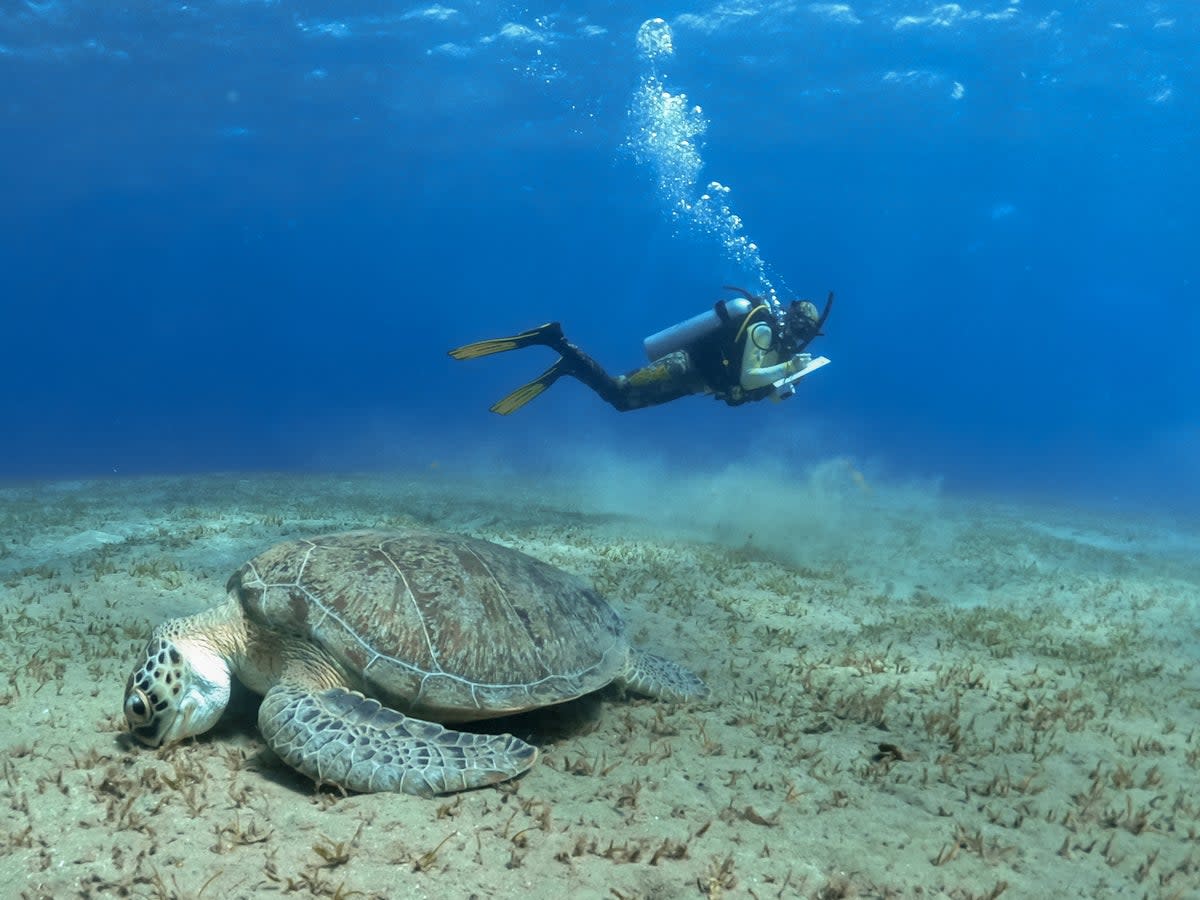
“I thought I saw dolphins on the reef this morning, but as I got closer I realised it was actually a huge plastic bag.” Hossam Abdelaziz’s words were not the sort you’d expect to come from a dive instructor – especially one whose job it is to extoll the beauty of the Red Sea – but then, this was not just any dive centre.
Stationed 280km – a 3.5-hour drive – from the sky rises and all-inclusive chains of Hurghada, the small Egyptian family-owned resort of Marsa Nakari in Marsa Alam has, since its inception, put the environment at the heart of its business plan. While government pressure pushed them to build more rooms, they based their maximum occupancy on what the reef could take without causing a negative impact (and simply appeased officials by putting up tents before surreptitiously removing them a few weeks later). When fossil fuels were heavily subsidised they bucked the trend and implemented solar power to reduce their carbon footprint. Now, while other resorts simply wax lyrical about the beauty of the coral in the waters, Marsa Nakari run a number of conservation programmes to help empower divers to contribute towards the protection of the underwater world while they enjoy it. So it’s perhaps not surprising that Marsa Nakari, along with their other two small properties operating under the banner of Red Sea Safaris, has just been officially recognised as an Eco Dive Center by PADI (Professional Association of Diving Instructors) – one of only 11 in the world.
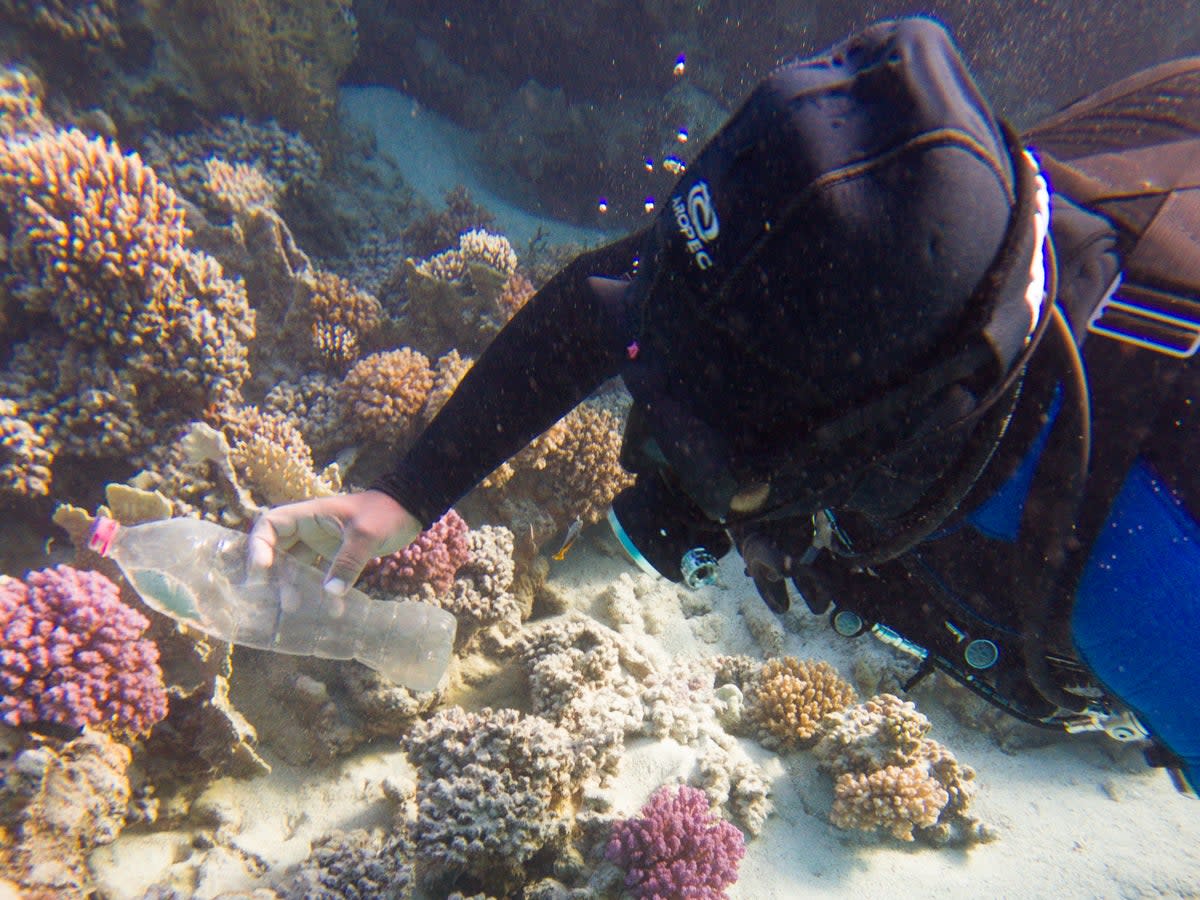
Amid its single-storey domed cabins, which made me feel like I was an extra in a Star Wars movie, I was undertaking a ‘Divers Against Debris’ course, a certification that they offer to all divers free of charge. In the short classroom session I had already learned how to safely remove rubbish from coral without damaging it, how to carry it safely to the surface, and – perhaps most importantly – how to sort and log what I’d found on an app so that the data can be fed into the world’s largest underwater database, used by lobbying groups to fight for protection of marine areas and enact government policy change.
Read more on sustainable travel:
I suited up for my dive, a mesh bag in one hand and a glove on the other. As I descended beneath the waves I was greeted by several blue spotted rays, busily moving about above the sand. The black-rimmed eyes of masked puffer fish peered up at me from behind orange fan coral. Yellow flashes of butterfly fish dazzled me, while tube coral resembling organ pipes reached up towards the surface as though sharing a tune. It was one of the healthiest reefs I’ve ever seen. Yet amid all this, there were pieces of manmade debris.
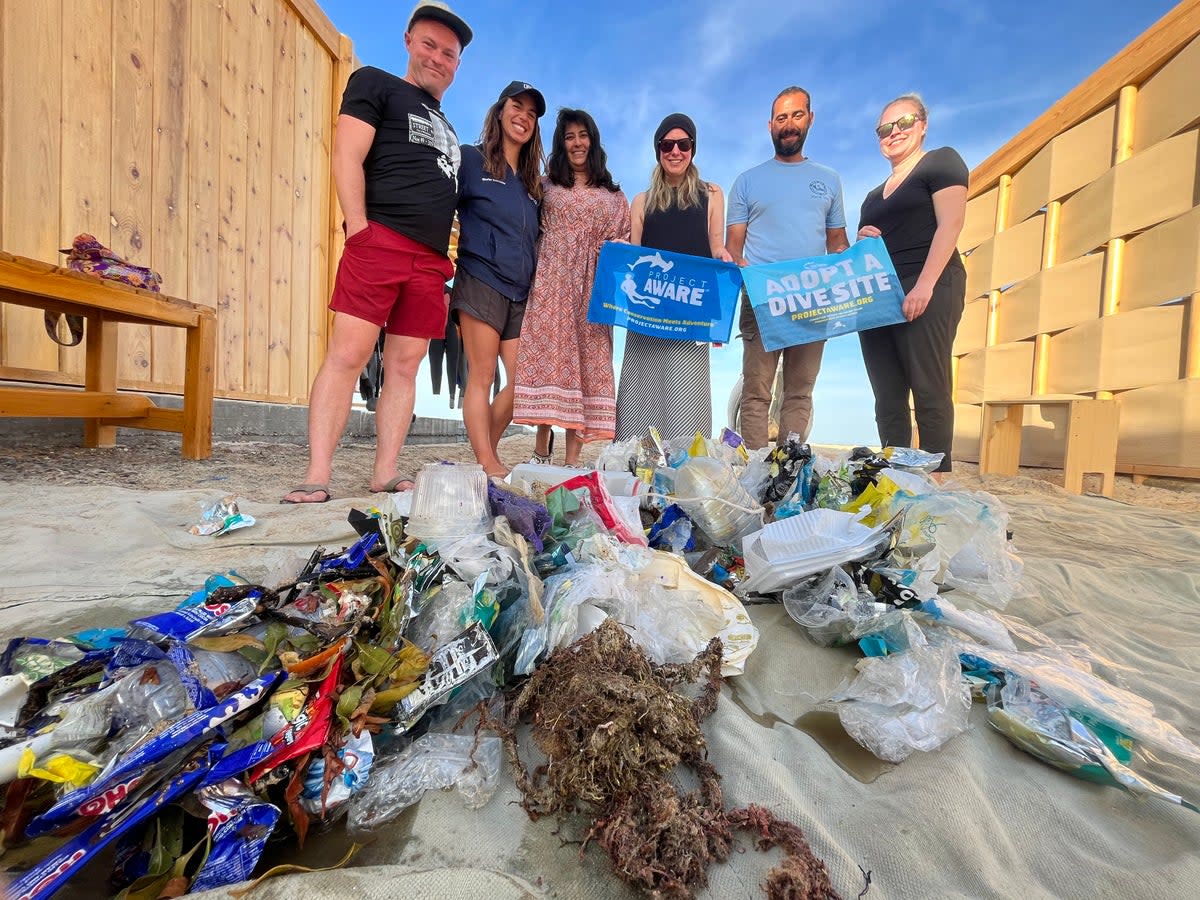
“Around 70 per cent of all debris entering the ocean sinks to the seafloor,” Hossam had said earlier. I watched him retrieve a plastic bottle now, while I made a beeline for a couple of bottle tops and, perhaps ironically, an ‘Aquafina’ water bottle label protruding from the sand. As we made our way closer to the shore, due to the way the prevailing wind blows into the bay, we saw increasing amounts of rubbish, from food wrappers and cigarette butts to single-use plastic cups and drink cartons.
Our team of five emerged with six bags filled, weighing in at 30kg. I felt a mix of pride from our endeavour and despair at the sheer volume of what we had found. We were exhausted and left the trash to dry while we went to feast on Koshary (a lentil, rice, chickpea and pasta mash-up with fried onion and tomato sauce). Re-energised, we returned to sort through our collection. We’d picked up a whopping 603 pieces of rubbish in under an hour.
It was one of the healthiest reefs I’ve ever seen. Yet amid all this, there were pieces of manmade debris
“Some resorts might try and hide this reality,” said Sarah O’Gorman, marketing manager of Red Sea Safaris, “but to hide it helps no one. We have to be open and honest and encourage everyone to keep our ocean clean.”
Since its original inception by PADI more than 10 years ago, the programme has seen 100,000 divers participate in Dives Against Debris in 120 countries around the world, recording the collection of more than two million pieces of rubbish. The data uploaded is given to the Ocean Conservancy, which reports on global beach debris, and CSIRO (Commonwealth of Scientific and Industrial Research Organisation), world leaders in marine debris research. It creates a whole picture of the marine waste issue that has been used to direct waste policy globally.
Just 26km to the north, Marsa Nakari’s sister site Marsa Shagra is larger in both capacity and environmental initiatives. A reverse osmosis solar-powered water purification plant has just been installed, they have a farm that grows fruit and veg to be served in the restaurants at all their properties, and free-range chickens lay the eggs served at breakfast.
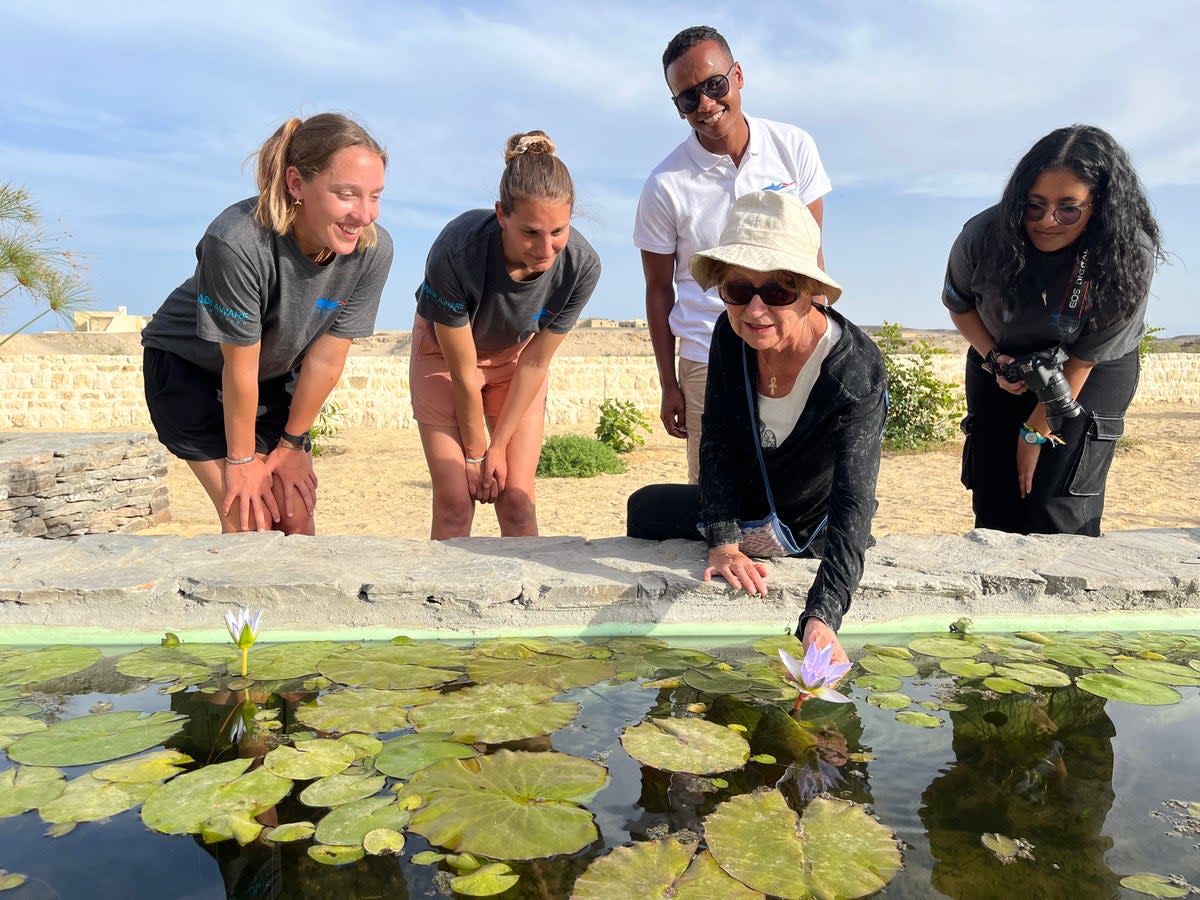
“The next goal is to use electric vehicles to pick people up from the airport, and run zodiacs by solar,” said Sarah. “We also want to be 100 per cent plastic-free here, but we have to work within the limitations of the country we operate in. Frustratingly, legally we have to wrap food in cling film, and need to supply one bottle of water in each room, even though we have clean water dispensers throughout the properties.”
After three nights at Red Sea Safaris, clocking up two to three dives a day and partaking in another conservation course with creator Dr Ahmed Shawky on the endangered dugong – a 3m-long, 500kg seal-like marine mammal aka ‘sea cow’, vital for the health of the ocean due to its ‘gardening’ of the sea grass – I saw the ripple effect of these trailblazers in newly opened property Wadi Sabrah. Built from repurposed fossilised limestone and partly powered by solar, it has been 10 years in the making. It is home to the Red Sea Project, which boasts environmental initiatives both on land and in water.
Dr Irina Springuel heads up the land side. A retired professor of ecology, she has created a desert garden here that teaches guests and locals (who come in through school programmes) about the importance of biodiversity, preserves rare and declining species, and teaches traditional Bedouin uses of Egypt’s endemic plants.
Some resorts might try and hide this reality, but to hide it helps no one
Sarah O’Gorman, marketing manager of Red Sea Safaris
In the water, Ahmed Fouad is leading an ambitious project attempting to gather baseline data on turtles in the Red Sea – a species about who very little research has been done here to date. Through a special one-day turtle surveying course, he plans to teach guests how to measure and photograph them and load their findings onto a database.
Before this visit I had written off the Red Sea Coast of Egypt as being lost to mass tourism with very little in terms of sustainability being done, but meeting people like Hossam, Irina, Ahmed and Sarah I have hope for change. It’s early days, but the impact of these small steps is clearly cumulative, much like the collective efforts of divers who collect debris can be.
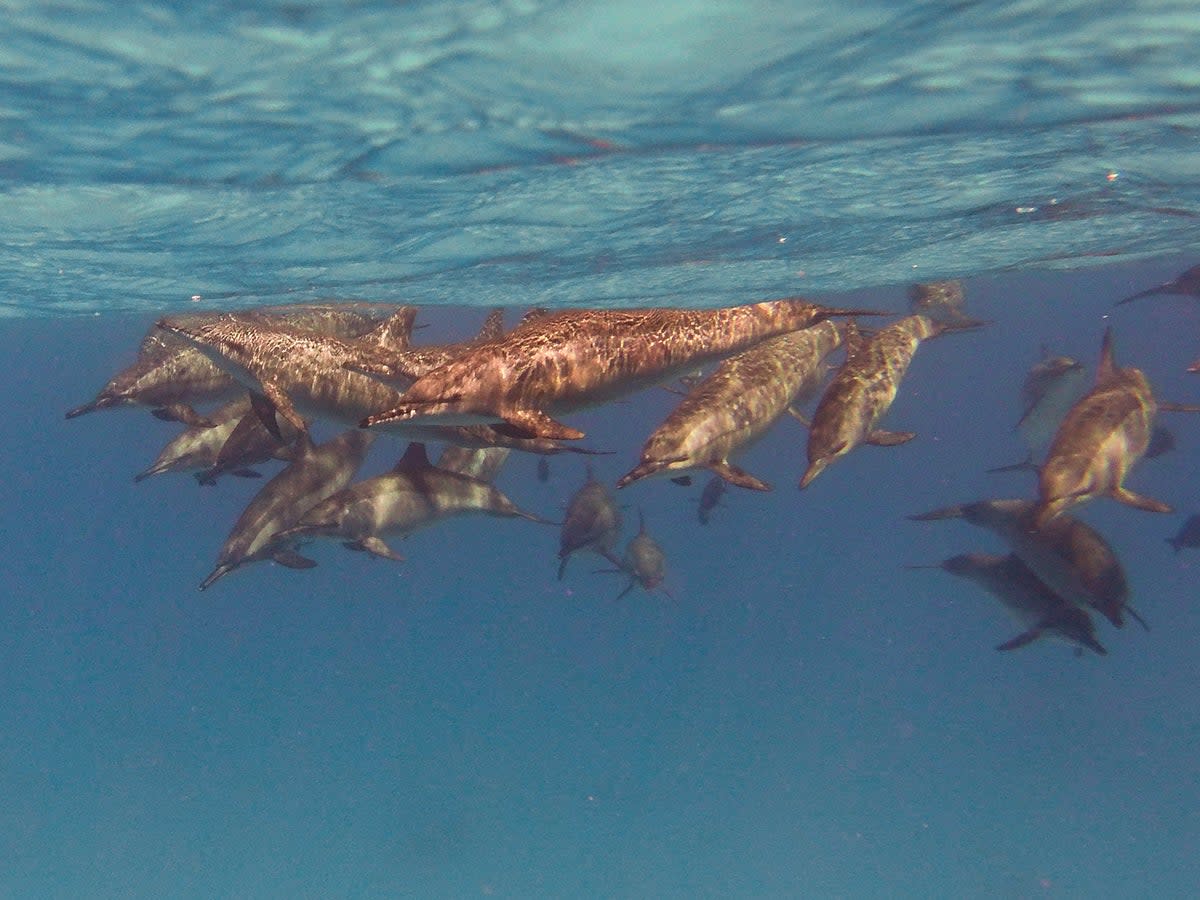
When I emerged from the water on the final day, after two dives of finning through canyons festooned with healthy hard and soft coral, the boat captain took our tanks and encouraged us to snorkel off the back of the boat. As we did, I was surrounded by a pod of 30 spinner dolphins – and not a plastic bag in sight.
Travel essentials
Getting there
EasyJet and Wizz Air fly direct from the UK to Hurghada.
Staying there
Stays at Marsa Nakari from €50pp for a beachfront tent and €81pp for a domed chalet, full board, including soft and hot drinks.
Stays at sister property Marsa Shagra from €59, full board.
A stay at Wadi Lahami from €90pp, B&B.
More information
Dive Packages from €70 per day (unlimited dives) or €315 for five days. Marsa Nakari offer Dive Against Debris course free of charge to guests. A Discover Scuba Dive Course is €72 including equipment hire. For more info on PADI courses see: padi.com
